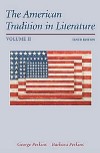Bartleby, the Scrivener is a study of the "anti" or "ironic"
hero that "declines" to participate in the essential conflicts that
set characters apart as either protagonists or antagonists. In Melville's rendering,
Bartleby anticipates in his "declinations" the existentialist movement
to the extent that he refuses to participate in any act that would render him
responsible. Billy Budd, Sailor is a symbolic work, best understood as an allegory.
One of the older forms of narrative in the European tradition, an allegory is
a work in which every major motif carries symbolic significance. The elements
of conflict are clearly delineated, and complexity is reduced to dualities in
which characters align in support of one side or the other. The Roman Catholic
Church introduced Christian allegory, first as morality plays, often
dramatized on oxcarts maneuvered from village to village as mechanisms of proselytizing.
In Christian allegory, characters represent various stereotypes associated
with the Judeo-Christian Bible or the lives of the Christian saints. Melville's
Billy Budd lends itself to such an interpretation with Billy Budd, in
his purity, a faint "Christ" figure, sacrificed for the good of the
community, and John Claggert, the Master-at-Arms, an embodiment of "natural
depravity according to nature." "Dansker," Billy's complement,
is the "seer" who charts a moral compass, in contrast to the "starry"
Captain Vere, who must make the human choice in the service of conflicting "goods." |



 2003 McGraw-Hill Higher Education
2003 McGraw-Hill Higher Education